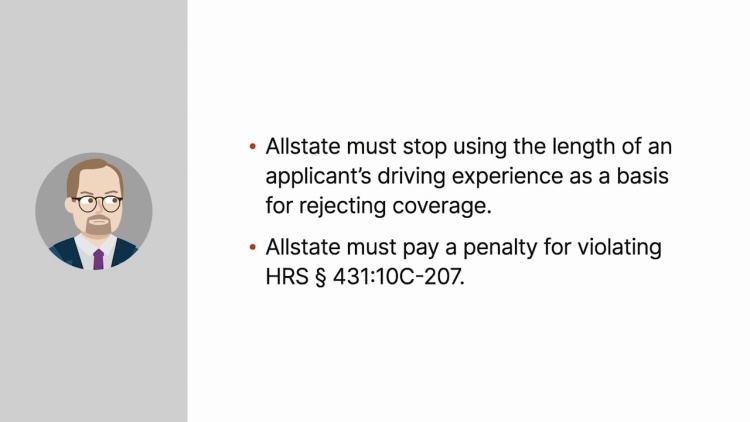Allstate Insurance Company v. Schmidt
Hawaii Supreme Court
88 P.3d 196 (2004)
- Written by Genan Zilkha, JD
Facts
On August 9, 1966, Kaoru Reinertson filed a complaint with the State of Hawaii’s Insurance Division against Allstate Insurance Company (Allstate) (plaintiff) and Allstate Indemnity Company (plaintiff) because she was denied insurance. The plaintiffs required an applicant to have a driver’s license for at least a year before the plaintiffs would insure the applicant. When Reinertson applied, she had not had a driver’s license for a year. On November 18, 1988, the chief deputy insurance commissioner (commissioner) ordered the plaintiffs to stop using an applicant’s length of driving experience as a basis for rejecting insurance coverage in underwriting. The commissioner also ordered Allstate to pay a $3,000 penalty for violating Hawaii Revised Statute (HRS) § 431:10C-207. This statute prevented an insurance company from basing “any standard or rating plan” on, among other things, an applicant’s length of driving experience. The plaintiffs requested a hearing. The hearing officer recommended that the commissioner vacate its order, because HRS § 431:10C-207 applied to rate making and not to underwriting. The commissioner reversed the hearing officer’s determination, concluding that the term “any standard or rating plan” in HRS § 431:10C-207 included underwriting. The plaintiffs appealed to the circuit court, claiming that the commissioner had improperly applied HRS § 431:10C-207. The circuit court affirmed the commissioner’s decision. The plaintiffs appealed.
Rule of Law
Issue
Holding and Reasoning (Duffy, J.)
What to do next…
Here's why 907,000 law students have relied on our case briefs:
- Written by law professors and practitioners, not other law students. 47,100 briefs, keyed to 996 casebooks. Top-notch customer support.
- The right amount of information, includes the facts, issues, rule of law, holding and reasoning, and any concurrences and dissents.
- Access in your classes, works on your mobile and tablet. Massive library of related video lessons and high quality multiple-choice questions.
- Easy to use, uniform format for every case brief. Written in plain English, not in legalese. Our briefs summarize and simplify; they don’t just repeat the court’s language.





